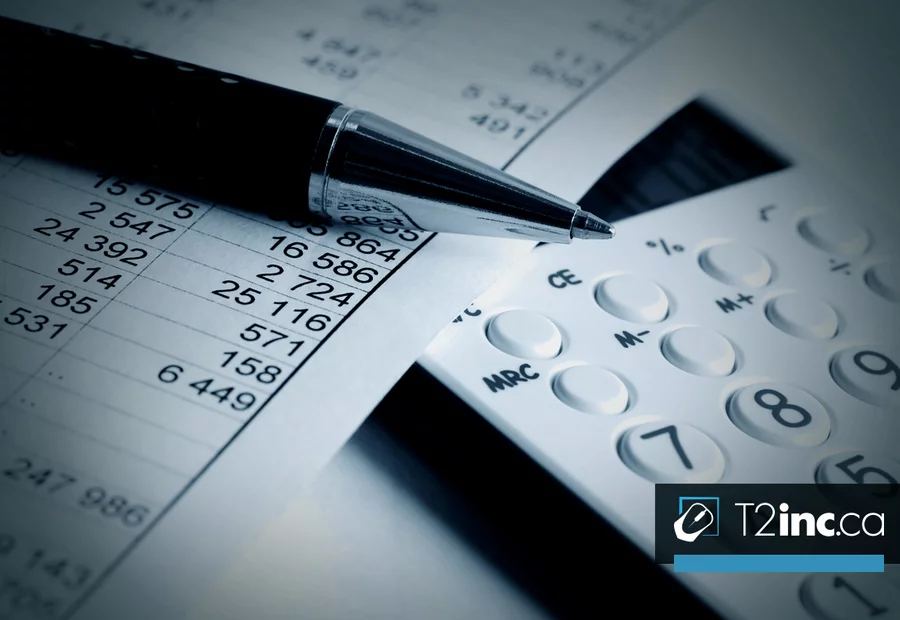Understanding Business Tax in Quebec: 5 Key Concepts

Business tax in Quebec has many exceptions and special cases, which can make it challenging to understand. Businesses are often subject to different rates depending on their legal structure (partnership, corporation, etc.) and sector (manufacturing, mining, telecommunications, energy, etc.).
However, despite these disparities, there are fundamental concepts of corporate taxation that every Quebec business should understand. To help you make sense of things and adapt to the constant evolution of Quebec’s business tax system, the experts at T2Inc.ca explain the basics of 5 of these key concepts.
1. The general tax rate for Quebec businesses
When we think of business tax rates in Quebec, we’re usually imagining the total amount a company will need to remit to the government. This amount is calculated using a tax rate specific to small businesses. It only applies to the company’s profits.
The general rate isn’t always easy to determine, because Quebec businesses are subject to both federal and provincial taxes. That’s why it’s best to enlist the services of a business tax specialist to help you with your company’s tax returns.
The federal tax rate
Under the Income Tax Act, companies must pay tax on the revenue they have generated over the course of the fiscal year, remitting it to the Canada Revenue Agency (CRA). The basic business tax rate across the country is 38%. It drops to 28% after the federal tax abatement, and then to 15% after the general tax reduction.
Furthermore, if you are considered an SME, there is a small business deduction (SBD) that brings the rate down to 10.5%. Whether or not a business qualifies for this rate will depend on its income and sector.
The T2 form is used to report business income at the federal level.
The provincial tax rate
In addition to federal taxes, Canadian companies must also file income tax returns at the provincial level. In Quebec, the forms must be filled out and sent to Revenu Québec, the organization responsible for the province’s tax laws and regulations.
The average general tax rate for small businesses in Quebec is around 8%. The rate varies depending on the company’s annual revenue, its sector and the number of employees it hires. Determining the precise tax rate for your business is a vital step towards optimizing the amount you pay Revenu Québec.
The CO-17 form is used to report business income in Quebec.
2. The small business deduction
If it meets certain criteria, a Canadian-controlled private corporation (CCPC) may be able to benefit from a small business deduction (SBD) that applies to its general tax rate for the fiscal year. This deduction is particularly advantageous for eligible SMEs and applies directly to Part 1 tax that the business would otherwise have to pay.
To calculate your company’s deduction, multiply the SBD rate by the lowest of the following:
- Taxable income (taking the foreign tax credit into account)
- Income from an eligible business operating in Canada
- The business limit
To be eligible, a business must meet the following criteria:
- It must be a Canadian-controlled private corporation (CCPC)
- Its employees must work at least 5,500 remunerated hours over the course of the year
- The proportion of primary and/or manufacturing activities must be 50% or more
3. Late penalties
The T2 and CO-17 forms must be submitted by the date set by the federal and provincial authorities. We recommend checking the deadlines every year to avoid filing late.
Filing your taxes late or failing to file them entirely can have very serious consequences for your company.
Delays incur heavy penalties with very high interest rates. Furthermore, any late penalties you incur will be doubled because you’ll have to pay them for both provincial and federal taxes.
Late penalties are fixed at 5% of the taxes payable to the federal and provincial governments. Furthermore, a business that forgets or delays its tax payments automatically loses all of the tax benefits to which it is entitled. Therefore, it is crucial to file and pay your taxes on time.
4. Business tax: when to file your returns
To avoid late penalties, it’s important to know when to file your business tax returns. Unlike personal income tax, business tax returns must be filed within the ten months preceding the end of the fiscal year. Payments must be made two months before the end of the fiscal year.
Businesses can file their tax returns by filling out the CO-17 and T2 forms and submitting them online or by mail.
5. Tax documents to keep
To comply with government requirements, businesses must keep their tax and accounting documents for a certain number of years. The retention period depends on the type of document in question. Some must be kept for 6 years (invoices, register, income statements, etc.) while others should be kept indefinitely (deeds, meeting minutes, share transfers, etc.).
Sometimes, the Canada Revenue Agency or Revenue Quebec will expressly request that you keep certain documents. In such cases, an agent will contact you by registered mail to inform you of the request.
Records and supporting documentation detailing a company’s profits and amounts paid should be carefully kept in digital format or recorded in internal documents.
Simple rules for understanding business tax in Quebec
Entrepreneurs need to understand the basic rules of business tax in Quebec in order to be able to anticipate annual expenses and avoid getting into trouble with the authorities. Being familiar with the rules can also help you determine whether your company is eligible for tax deductions and optimize your tax rate.
Whether you need tax advice, support for a specific purpose or a corporate accountant, our teams are here to help. Feel free to contact us to discuss your company’s tax situation.
Contact our experts
Have a question? Need help? Fill out our online form to get help from our experts.
Contact usNeed more help?
Contact us by filling out our form
Are you interested in our services, but would like more information before taking the plunge? Contact us today and one of our tax accountants will be in touch to help you.
At T2inc.ca, we're committed to helping business owners manage their company's tax affairs so they can grow their business.




